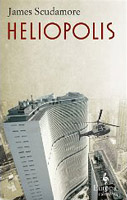Brought up from the shantytown of Heliopolis during the first year of his life, Ludo has been adopted by Zé Generoso, super-wealthy supermarket-chain mogul, and his family. He then lives in the family's fazenda with his mother who serves as a cook, and sees them on weekends when they arrive by helicopter from the city.
These recollections of his childhood, as he is now working for an advertising company, show us the life of a rich kid who keeps something of a favela eye when he looks at the world around him, the gated city with its private police, the helicopter that enables his father to never put the foot on São Paulo's ground.
Entering the bathroom to wash the smell of crabmeat off my hands, I find a very old, very black man sitting on a chair by the basins, a small plate of tips by his side. When I enter he leaps up to brush my shoulders, squeeze soap on to my hands, anoint me with aftershave - whatever I request. It embarrasses me. I tell him to stay seated and, realising I'm carrying it in my hand, I offer him the shirt from the officeHeliopolis (Europa Editions, 2010, 304 pages) is the second novel written by the British author James Scudamore, who grew up in Japan, Brazil and the United Kingdom, and won the Somerset Maugham Award in 2007 for his first novel The Amnesia Clinic.
“It's clean,” I say. “And brand new. I have no need of it."
He shrugs, feels the material with the tips of his fingers, and thanks me. I'm sure it's a better gratuity he's used to, but as soon as I've left I worry that I have patronised him. The hotel uniform he is made to wear seems, at his age, to be an assault on his dignity as it is, and maybe I have made things worse by offering him my cast-offs.
Heliopolis is also available in French under the title of Fils d'Heliópolis.

No comments:
Post a Comment